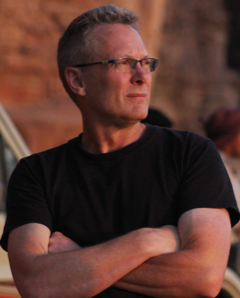MAX ZAMBRANO – STAFF WRITER

Kelly James Clark wasn’t always interested in China.
“I didn’t think anything important came out of the East — not actively, I just thought everything important came out of America or Europe,” he said.
Then, after attending some conferences in China, things changed, He learned.
“I realized what happened in China was that we Americans would go and present our philosophical ideas, and Chinese would adapt to us,” he said. “I realized if we were actually going to have dialogues, we needed to start listening to them. We needed to start understanding traditions that shaped and informed them.”
At 1 p.m. today in the Amphitheater, Clark will make his first visit to Chautauqua to discuss his research and findings in his lecture, “A Spiritual Geography of Early Chinese Thought,” part of the Week One Interfaith Lecture Series, “21st Century Religion in China: Collaboration, Competition, Confrontation?”
Clark’s lecture is based on his forthcoming book, A Spiritual Geography of Early Chinese Thoughts: Gods, Ancestors, and Afterlife. He has written over 30 books, including others on China, and is the former Senior Research Fellow at the Kaufman Interfaith Institute at Grand Valley State University. He has also served as the director of many interfaith, philosophical and scientific conferences.
When he first traveled to China, Clark didn’t expect to find anyone who believed in what he called a High God: a deity who lives in the sky, removed from the world. These preconceived notions came from people Clark trusted and deemed experts, he said.
As he researched ancient texts, Clark discovered that people in China did seem to believe in a High God, and they believed their ancestors’ souls existed in the afterlife.
“I began to see, in text, that China was kind of a spirit-haunted world — from malevolent spirits all the way to basically a benevolent High God,” he said.
Clark’s study of Chinese philosophy began after graduate school. He has never taken a formal course on it, but he has worked with scholars who helped him read and translate original Chinese text, and he has done plenty of his own reading, too.
Clark said he hopes his book rewrites perceptions of what early Chinese believed. Although focused on early Chinese thought, Clark said he believes this has implications for understanding contemporary China, too. For example, he believes most people in China believe in an afterlife, which he did not think was true before his research.
After receiving a grant, Clark expanded his book to include research on early Chinese afterlife beliefs. Before that grant, afterlife research wasn’t on his radar, because people told him Chinese didn’t believe in afterlife.
Clark, who also works in cognitive science, wanted to learn how thoughts on the afterlife and High Gods influenced structure, order and rituals in ancient China.
He also learned there is no such thing as “the Chinese.”
Citing China’s broad history and geography, Clark said he believes there was at one time more than 100 different languages, or dialects, in early China. A written language was eventually developed because they had so many different spoken languages, he said.
“One thing that I think is really important about China is whenever anyone says ‘the Chinese,’ or begins a sentence with ‘the Chinese,’ it’s almost certain to be wrong,” he said. “It’s a really diverse group of people, diverse throughout their long history, well over 2,000 years, and diverse across their really big geography, as well.”
Clark hopes to make China less mysterious in order to bridge a connection between the East and the West. He said, for one, Chinese versions of God were not that different from Western versions.
“They’re the next great empire, and we need to work hard to understand them,” he said.
He hopes people realize that on some level, Americans, or the West, and China, or the East, are similar in their aspirations, beliefs and practices.
“Maybe down deep, we’re not so different,” he said.




